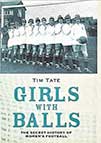 The secret history of women’s football
The secret history of women’s football
by Tim Tate
John Blake, £17.99
Reviewed by Georgina Turner
From WSC 324 February 2014
“The secret history of women’s football” seems a tall promise for those of us who are interested in the women’s game. The story of the pioneering team formed in the yard of the Dick, Kerr factory in Preston in 1917, which is the one the author highlights from the book’s start, is not a “secret” to anyone who has read Gail Newsham or Barbara Jacobs’ books on the subject. Happily, both authors are among those credited in later chapters – by which point Tim Tate’s assurance that his is a “more rounded” account of the early days has been well met.
Told in 14 short chapters, the book hops this way and that across the globe. The episodic structure allows tales of social conditions – cotton famine, for example, class friction, suffrage, world war, factory life, Spanish flu, enduring misogyny – to sit alongside and contextualise the various attempts to establish women’s football in the UK before the FA’s outright ban in 1921 made things next to impossible.
The correlation between the FA’s decision and Dick, Kerr’s landmark match at Goodison Park on Boxing Day 1920 is probably one of the most well-known moments in this history. With the FA already irked at its billing as a cup final, the match attracted a crowd of 53,000, with at least 10,000 more out in the streets – at a time when some men’s league matches were struggling for double figures. It was one in the eye, all right, but the book does a good job of fleshing out the FA’s relationship with the women’s game, one that bore the brunt of the FA’s frustration at its own haplessness. Having been shown up by illegal payments and match-fixing in men’s football, the FA set its jaw at signs that the Dick, Kerr manager might be taking home more than his expenses.
There are excerpts from contemporary records and write-ups throughout the book, whose cadence (not to mention their moral outrage) transports you back in time. “The husbands – what about them!” yelps a reporter from the Westminster Gazette in 1895, as the mythical Nettie Honeyball explains that several players at the British Ladies’ Football Club are married. These curios allow the book to chart an interesting shift in press commentary, from the contemptible wagon circling ahead of BLFC’s first fixture to the generally positive coverage of Dick, Kerr’s charity matches, and sometimes thoughtful reaction to new developments. When a woman applied for a place on a referees’ course, for instance, the papers thought it a question worth pondering. Alas they soon succumbed to the briefings of men concerned about the innards of the next generation of mothers, and the FA’s refusal to accept female applicants settled in to fact.
Reading this book feels much like walking around an exhibition: Tate has curated a collection of artefacts that can be enjoyed for themselves but together offer the reader a real feel for the journey that women’s football has been on. There is considerable overuse of the phrase “would come back to haunt the sport”, but this probably says more about that journey, set back and off course by the same troubles over and again, than it does about the author. For an illustration of the suffocating habits of committees of “old farts”, look no further.
 Poverty, war and football
Poverty, war and football
